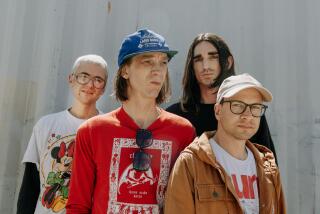Soft Feelings, Hard Edge
- Share via
Lou Barlow doesn’t look much like a rock star, standing on a makeshift stage at Tower Records in West Hollywood as his band Sebadoh prepares to play a few songs to promote its new, acclaimed album, “Harmacy.”
In his faded T-shirt and jeans, the shaggy-haired, bespectacled singer-guitarist looks as if he’d be more at home in a computer lab or behind the counter in a used bookstore.
As a clutch of excited kids bum-rushes the stage, Barlow--who had casually stepped up to check the microphone--seems startled and a touch embarrassed by the commotion.
“OK, OK,” he says good-naturedly. “Calm down. . . . “
Barlow, 30; bassist Jason Loewenstein, 24; and drummer Bob Fay, 33, then deliver a seamless set of folk-rock ballads, angst-driven rockers and one speed-punk assault.
The latter, “Psyched to Die,” is a rare treat--a decade-old song from the days when Barlow and his high school buddy J Mascis had just formed their first band, Deep Wound.
From there, the pair went on to form Dinosaur Jr., one of the most heralded alternative rock bands of recent years.
Because Mascis was the dominant figure in that group, which eventually signed with Sire Records and was featured on the 1993 Lollapalooza tour, few people even noticed when Barlow left the group in 1989.
But Barlow did start getting attention as soon as his new band, Sebadoh, began putting out albums on tiny Homestead Records. The interest turned to raves in 1991 with Sub Pop Records’ release of “Sebadoh III,” an album whose understated production approach was one of the first steps in the emergence of the “low-fi” movement in ‘90s rock.
Barlow’s songs were hailed for their sensitive, introspective looks at relationships and addictions. His music seemed to come at you with complete openness and honesty.
Still, no one figured in 1991 that Sebadoh would ever move out from the shadow of Dinosaur Jr.
Five years and four albums later, Sebadoh, which headlines the Roxy on Wednesday and Thursday, has arguably passed its rival in terms of influence and respect on the alternative rock circuit. In reviewing “Harmacy,” Rolling Stone called Barlow the male Liz Phair. Spin says that “with ‘Harmacy,’ Barlow and his bandmates maintain their status as champions of the private moment.”
*
Unlike many songwriters, Barlow tends to be as revealing in interviews as he is in his music.
“When people ask me where the songs come from,” he says during lunch at a Mexican restaurant in the Fairfax area earlier in the day, “I just try to be honest. . . . If I heard [his] ‘Soul and Fire,’ I would like to ask the songwriter where it came from. I’d want to know, ‘Is this real? Did this really happen to you?’ . . . I’m just not at the point where I have to be so protective about what I talk about. I hope I never get there. . . .”
Barlow, a Jackson, Mich., native whose family moved to Westfield, Mass., when he was in his teens, grew up a quiet outcast who was attracted in his early teens to the immediacy of punk rock, especially the East Coast hard-core bands such as Minor Threat and Youth Brigade.
“That’s really what I needed to hear then,” he says. “They were really unaffected. It was this weird experimental music, rock stripped down and sped up in a totally non-rock way. It was like folk music, it was just so devoid of any kind of rock influence.”
After high school, Barlow fell under the spell of the lyrics of Neil Young and Joni Mitchell. It was around this time that he and his friend Mascis teamed up, eventually forming Dinosaur Jr., a group that combined elements of folk-rock gentleness and punk aggression.
As the trio rose to prominence, guitarist Mascis and bassist Barlow struggled for dominance. Barlow lost and was kicked out of the group in 1989. “J and I didn’t communicate very well,” says Barlow. “I’d just gotten a girlfriend, which gave me more of a personality. I was talking more. And J wasn’t very tolerant back then.”
Angry, Barlow retreated to his living room and started recording songs that were as staticky as they were painfully honest.
With his high-profile rock life dead, Barlow felt free to speak his mind and heart.
He was so good at it that some of his compositions--”my heartbreak songs,” he calls them--actually won back his girlfriend, Kathleen Billus, after she had left him. Barlow and Billus are now happily married, and you’d be hard-pressed to find a Sebadoh fan who doesn’t know the story.
His sensitive songs and bare-bones approach to recording not only established his own band’s identity, but also jump-started “low-fi,” a small movement of basement studio mavens that includes such prominent indie-rock forces as Pavement and Guided by Voices.
Barlow formed Sebadoh in 1989 with drummer Eric Gaffney (who was replaced by Fay in 1993) and Loewenstein, releasing “Freed Man” on the Homestead label. A hard-working, prolific bunch, Sebadoh has spawned offshoot bands ranging from Barlow’s Sentridoh (which smacks of early Sebadoh four-tracks) to Folk Implosion (which delivered the hit “Natural One” from the “Kids” soundtrack), Loewenstein’s Sparkalepsy and Fay’s Unconvinced.
Barlow shares songwriting duties with Loewenstein, whose songs provide a screeching counterpoint to Barlow’s introspection. But everything Sebadoh did, from the earliest Homestead releases to the low-fi touchstone “Sebadoh III,” was uncommercial to the core. The wild mix switches from lilting folk-rock to fuzz-box feedback to punkish howls, an unlikely cross between the soft-pop expressions of Bread, the roar of Sonic Youth and a dash of the manic thrash of the Minutemen.
Critics loved this unbridled sound, especially the 1994 breakthrough “Bakesale,” which sold an impressive 80,000 copies. But detractors thought that the music lacked focus. “There was always this spanking tone,” Barlow says, remembering old reviews. “Like, ‘Oh, you guys, if you could only tighten things up.’ ”
“Harmacy” has done just that, with a slicker production and more conventionally structured songs. Still, Barlow holds on to Sebadoh’s original subversive ethic.
“I just am really bored by what passed for classic records and cohesive bands,” he says. “That’s cohesive? Whatever. Sounds boring to me. . . . What we do is more than that. It’s about our collection of personalities and what we do as people. We’re not trying to write our way into rock history.”
*
Sebadoh plays on Wednesday and Thursday at the Roxy, 9009 Sunset Blvd., West Hollywood. 8 p.m. $12. (310) 278-9457.
More to Read
The biggest entertainment stories
Get our big stories about Hollywood, film, television, music, arts, culture and more right in your inbox as soon as they publish.
You may occasionally receive promotional content from the Los Angeles Times.








